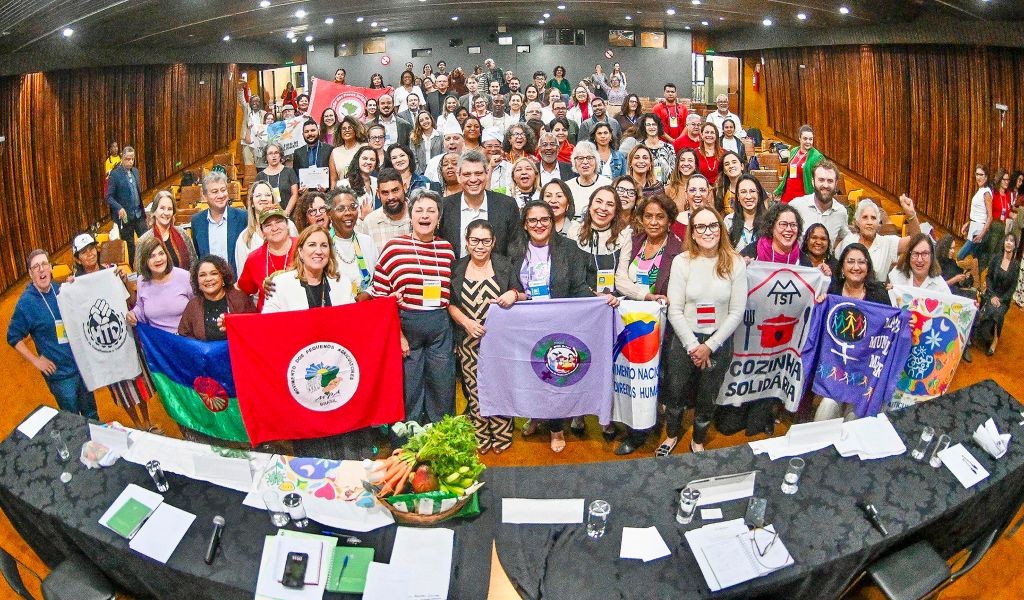One of President Lula’s early acts as President of Brazil for the third time was to reinstate the national food and nutrition security council, after the previous President Jair Bolsonaro had dismantled it in 2019.

Earlier this month, I was at the inaugural meeting for this council, which aims to formulate, monitor and evaluate public policies concerning food and nutrition sovereignty and security. Here, I explain more about this important initiative.
Consea is back in full
As happens every two years, the first plenary meeting of the National Council for Food and Nutrition Security (Consea) took place from June 11 to 13 2025, when councillors representing civil society and government bodies were made official for the period 2025/2026. During this plenary session, the new president of CONSEA was also elected from among the representatives of civil society, as defined in the rules governing the Council. It is worth noting that the elected president, Elisabetta Recine, and the council members Cláudia Schmitt and Silvia Zimmermann are researchers participating in the Food Equity Centre.
What is Consea?
Consea is an advisory body to the Presidency of the Republic of Brazil whose main attribution is to propose and monitor public policies related to food and nutrition sovereignty and security (FNSS) and the human right to food (RtF). After a short existence (1993-1994), the Council has been resettled in 2003 as a public space for social participation with 2/3 of its members as civil society representatives coming from very diverse social sectors and 1/3 of government representatives from different ministries. The present composition has 48 civil society representatives and 24 ministries.
A joint civil society-government commission decides on the proportional distribution of vacancies and the consultation process with social organizations and movements. The process is aiming at a composition as heterogeneous as required by the intersectoral, multidimensional and multiscalar approach to FNSS/RtF consecrated in Brazil.
Read more: the link between inequities and poor diets in Brazil
Councillors represent indigenous people, traditional people and communities, family farmers and landless rural workers, fisherfolks, black people movements, homeless people, youth movements, professionals and academic with distinct backgrounds, agroecological networks and charitable entities. Gender, ethnic/race and region are cross-cutting criteria.
Why consolidating this space is crucial
Inclusive and participatory policymaking
Councils for social participation in various areas of Brazilian public policies resulted from the advancement of participatory democracy following the Federal Constitution of 1988. In the case of Consea the priority given to overcoming hunger and promoting FNSS / RtF was also a determinant factor in its creation. Furthermore, the above-mentioned composition of civil society representatives allows for equity concerns in policy making and implementation. The functioning of the Council is fully funded by public budget including an administrative body and related expenses, and the cost of councillors’ travelling and lodging for three to four presential meetings per year in Brasilia, with the recent use of online intermediary meetings. National Conferences are held each four years, gathering up to 1,500 delegates elected in state conferences plus public managers appointed by the Federal Government to monitor and make propositions to the National Policy for Food and Nutrition Security.
Broadening the knowledge and evidence base of policy
The definition of Consea’s agenda and the contents of the debates in the plenary sessions are largely constructed by Permanent Commissions mixing civil society and government representatives, having special guests (e.g.: researchers, experts and social organizations) according to the topic under consideration.
Topics could be related to the building up of the National System for Food and Nutrition Security, food environments and nutrition, production and provisioning of healthy and adequate food, the right to adequate food, food and nutrition sovereignty and security of social groups such as black people, indigenous people, traditional people and communities. Temporary working groups are formed to address specific topics with a defined scope and deadline, as for instance the international agenda and conflicts of interest.
In all these spaces (conferences, plenaries, commissions and groups), dialogue between researchers, social actors and public managers occurs in a bidirectional manner, either by researchers presenting results of their studies and the corresponding public policy proposals, or by offering arguments based on research for the proposals under discussion.
Holistic, intersectoral approaches to policymaking
The scope and diversity of aspects encompassed in the Brazilian conception of intersectoral policies for the promotion of FNSS/RtF results in an equally large and diverse set of propositions made by Consea. Many positive assessments were made regarding the effectiveness of the Council’s proposals, despite their consultative nature.
Among the areas with programs created or improved by the Council’s work, we can mention: priority acquisition of food from family farming; reorientation of school meals; intersectoral strategy for adequate and healthy eating; promotion of agroecology; tackling the use of agrochemicals; reducing the consumption of ultra-processed foods; diffuse access to water by rural families in the semi-arid region; differentiated treatment for indigenous peoples and quilombola communities; food and nutrition education; and Brazil’s international performance, highlighting South-South cooperation.
Priorities moving forward: climate and intersecting inequalities
In the first plenary session, the councillors were divided in working groups dedicated to analysing the eight announcements of the 3rd National Plan for Food and Nutrition Security recently launched by the government. The aim was both to identify priority themes that will lead to the definition of permanent commissions, and also to begin defining mechanisms and processes for monitoring the Plan by Consea. It became clear that the Council’s approach to monitoring should add to what the government has already defined as indicators for achieving targets, approaches that qualify how and for whom policies and programmes are reaching, based on the principles for realising the human right to adequate food. Two broader themes were also added to be prioritised, namely the climate issue and the different expressions of inequalities.
